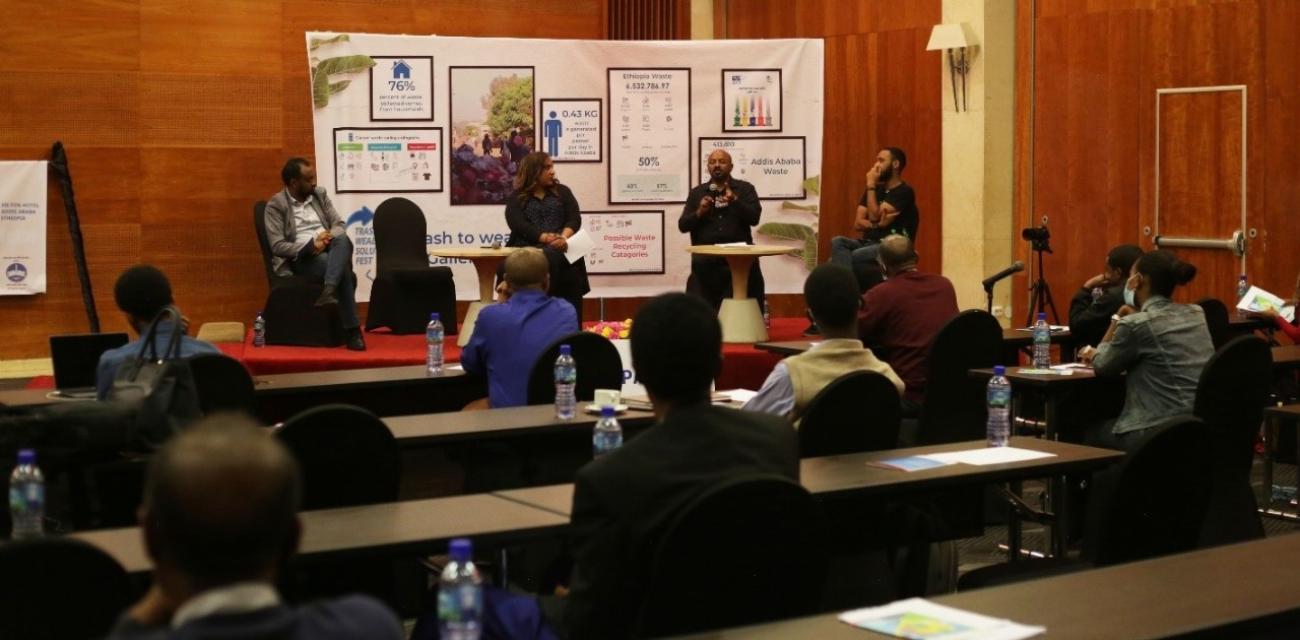Celebrating waste: How do we build an ecosystem in solid waste recycling, reuse, and upcycling?

Celebrating waste: How do we build an ecosystem in solid waste recycling, reuse, and upcycling?
When it comes to waste management we know that the informal sector plays a major role in upcycling and recycling waste. However, to make a significant impact and reduce the amount of waste that goes to landfills, we need to mobilize the private sector. We also need to build a compelling case and demonstrate return on investment. Why do solid waste recycling, reuse and upcycling make good, clean (and green) business sense? The market for segregated waste and waste products is currently be limited to recycling plastic and composting organic waste. However, there is a real opportunity as well as encouraging signs that turning waste into usable items (upcycling) and recycling paper, rubber, metal, among others, has the potential to grow in Ethiopia.
Buoyed by this prospect the Accelerator Lab sought to explore and experiment this further by reaching out and connecting with key stakeholders and budding innovators interested in recycling, reusing, and upcycling. To operationalize this, the Lab Team embarked on a Solution ‘Safari’ to map out different waste products that can be profitable for waste collectors and held a solution fest to introduce waste and sustainable products. This expedition enabled us to listen to various inspiring stories of young people building their creative businesses while being environmentally conscious.
The Solution Fest
As a next step, the Accelerator Lab collaborated with the Addis Ababa Solid Waste Management Agency to organize a two-day solution fest that attracted over five hundred visitors. The fest enhanced local engagement within the ecosystem, providing an opportunity to explore the possibilities for stimulating the existing waste market and creating connections across the value chain for a robust and environmentally sustainable waste management system. The fest exhibited start-ups and innovators working with waste products, matched waste collectors, municipalities, and private sectors within the value chain, and held a dialogue to enhance community engagement within the ecosystem.
The event created a unique opportunity and space for the exhibitors to showcase their innovations, explore connections with potential partners and initiate business transaction discussions with potential clients. In addition, it provided an opportunity for wider networking among the ecosystem players, as was reflected during the storytelling session provided for during the event.
Scaling Deep
During the event, we engaged in a futuristic and solution-driven discussion about waste management, including looking at how we can improve the market for recycling, upcycling, and reducing waste. In two panel discussions, we looked at how we can move towards sustainable waste management from the environmental, public health, and job creation perspectives. These dialogues were the highlight of the event, helping participants to generate ideas and lessons. The exchanges focused on building a waste management ecosystem that is open to economic opportunities, has positive impacts on cultural practices and influences policies and programmes.
Theme one - The Future of Waste Management: Strategies for Economic Opportunity and Environmental sustainability. The session raised several learning questions like, what is the approach for a waste management system that is environmentally sustainable that is open to economic opportunities? How is the Public-Private Partnership working in waste management? What does research reveal about trends in waste management? How do we coordinate our efforts and create synergies for the future?
Representatives from the government, a private recycling company, UNDP’s NAMA compost project and Waste to Energy researchers reflected on these points.
Theme two - What opportunities exist? Their role in building a circular economy on waste.
The second dialogue brought together multi-national corporations, environmental social movements, and urban design innovation hubs to share their experience and practical approach on the theme.
Their story focused on developing a shared responsibility and approach to waste management, the key issues and challenges. Other questions included how to open waste as a business/ job opportunity, identifying opportunities for creating a circular economy, and creating connections across the waste value chain? How does advocacy contribute to a shared responsibility for waste management?
Interesting reflections shared during this discussion included tackling the challenge caused by the absence of a proper system design from waste collection centre to waste disposal. The discussants emphasized the need for end-to-end design thinking in the waste system.
At the end of the discussions, we captured important learnings on how people can get into upscaling or recycling business, making it profitable, green and sustainable. These are captured below:
- Addressing the issue of coordination - participants agreed that creating a pipeline between the research that is happening at universities on waste to energy and experimenting with them at a municipal level is a good idea that needs to be explored further.
- Tackling the question of environmental sustainability- participants underlined the need for a stricter legal framework for enforcing waste segregation. This is particularly key in addressing the problem of e inferior quality of paper waste and by composters.
- Ensuring quality standards - participants stressed that products produced from the process of recycling should be well designed and marketed as lifestyle products. There should be a focus on instilling excellence in all systems and processes, and this can only happen through investing in proper training and quality assurance. In this regard, participants added that understanding what to recycle, when, where and who would use the final item is equally important.
- Importance of design thinking - participants also stressed the need to have end-to-end design thinking in the waste system that can address the needs of all stakeholders and create opportunities.
“We need to move from passion and stories for recycling to proper design thinking and system,” said Mahder who is a founder of the Urban centre.
If you are interested in this topic and have any ideas or suggestions, we would love to hear from you through email address. ethiopia.acclab@undp.org.



